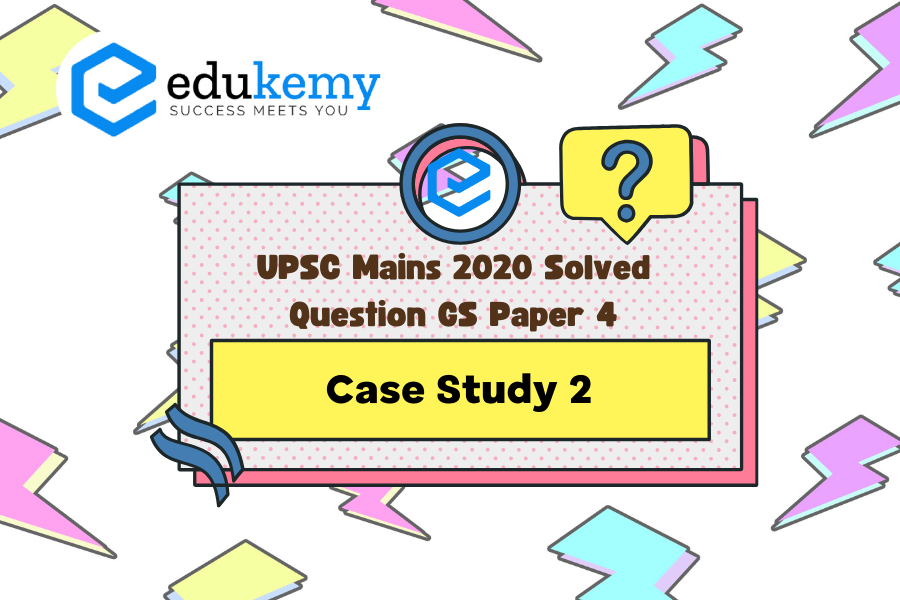The UPSC (Union Public Service Commission) examination is renowned as one of the most prestigious and challenging competitive exams in India. In the year 2020, the General Studies Paper 4, often referred to as GS 4, presented candidates with a diverse array of ethical dilemmas and situational questions. This paper aimed to evaluate the ethical and moral aptitude of aspiring civil servants, testing their ability to navigate complex issues with integrity and sound judgment. Through a series of case studies and theoretical inquiries, candidates were required to demonstrate their understanding of ethical principles and their practical application in governance and public administration. The UPSC GS 4 paper serves as a crucial benchmark for selecting individuals who possess not only the knowledge but also the ethical fortitude necessary to serve the nation with honesty, fairness, and dedication.
Q8. The Chairman of Bharat Missiles Ltd (BML) was watching a program on TV wherein the Prime Minister was addressing the nation on the necessity of developing a self-reliant India. He subconsciously nodded in agreement and smiled to himself as he mentally reviewed BML’s journey in the past two decades. BML had admirably progressed from producing first generation anti-tank guided missiles (ATGMs) to designing and producing state of the art ATGM weapon systems that would be the envy of any army. He sighed in reconciliation with his assumptions that the government would probably not alter the status quo of a ban on export of military weaponry.
To his surprise, the very next day he got a telephone call from the Director General, Ministry of Defence, asking him to discuss the modalities of increasing BML production of ATGMs as there is a probability of exporting the same to a friendly country. The Director General wanted the Chairman to discuss the details with his staff in Delhi next week.
Two days later, at a press conference, the Defence Minister stated that he aims to double the current weapons export levels within five years. This would give an impetus to financing the development and manufacturing of indigenous weapons in the country. He also stated that all indigenous arms manufacturing nations have a very good record of international arms trade.
As the Chairman of BML, what are your views on the following points?
a. As an arms exporter of a responsible nation like India, what are the ethical issues involved in the arms trade? (250 Words, 20 Marks)
Tag: Case study
Answer:
Case Summary:
It is given in the case, the Chairman of BML who believed the country would not export its state of art Anti Tank Guided Missile (ATGM) weapons. Later he gets to know about the intention of the government to export ATGM to friendly countries and double the weapon export within the next 5 years. It impetus and boost to indigenous defense manufacturing and will lead to export of arms.
Stakeholders Involved in the Case:
- Chairman of BML and its employees
- The Government of India
- Foreign government
- Society at large
Ethical Issues involved in arms trade:
- The primary use of weapons is to kill other humans. The earnings made from the arms trade are like blood money. Killing is inherently wrong and it is against humanity which is one of the central ideas of the Indian way of life.
- India has been a land of Gautam Buddha and Mahatma Gandhi. They have advocated non-violence. But by indulging in arms trade, India will be endorsing violence, but in a different region of the world.
- Article 51 of the Directive Principle of State Policy says that the government should aim for promotion of international peace and security.
- By indulging in arms trade, India might be endorsing the actions and policies of foreign governments by which India may not stand. For example, selling weapons to autocratic countries and regimes known to suppress dissenting voices. In India, the government is accountable to parliament and weapons should be sold to democratic countries so that users can be held accountable.
- While engaging in arms trade, India should ensure that arms exported are not being used to suppress dissent or subvert democracy or invasion of peaceful neighbors. India should ensure use of exported weapons in self-defense and also not against India’s own interest short term or long term.
The ethical factors that would influence the decision to sell arms to foreign governments:
- India’s National Interest: Anything which is India’s national interest, we would go for that and anything which is not India’s national interest, we would not go for that.
- India’s policy towards foreign government and their legitimate needs:
- It should be at par with international regulation. No international arm trade could be conducted without following the international regulation.
- Combating regional and international terrorism and organized crime.
- Foreign governments guarantee protection against misuse.
India needs to boost its arm export to reduce its dependence from foreign countries and become self-reliant in defence needs. At the same time, as a responsible country, India would never engage in unethical; arms trade with foreign government having dubious human right record, violation of international norms and poor track record in arm proliferation.
In case you still have your doubts, contact us on 9811333901.
For UPSC Prelims Resources, Click here
For Daily Updates and Study Material:
Join our Telegram Channel – Edukemy for IAS
- 1. Learn through Videos – here
- 2. Be Exam Ready by Practicing Daily MCQs – here
- 3. Daily Newsletter – Get all your Current Affairs Covered – here
- 4. Mains Answer Writing Practice – here


